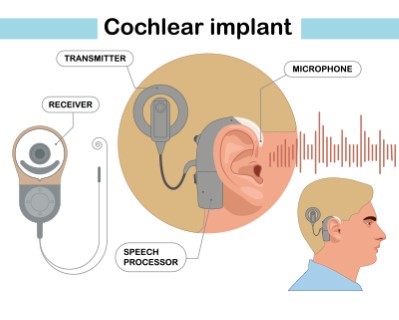Cochlear Implant Surgery
- Purpose: Provides a sense of sound to individuals with severe hearing loss.
- Procedure: An electronic device is surgically implanted in the ear to stimulate the auditory nerve.
-
Note: The information provided here applies to routine Cochlear Implant Surgery under standard conditions. However, specifics may vary depending on individual patient factors, such as the severity of hearing loss, patient tolerance, or any complications that might arise during or after the procedure. The patient’s overall health, the complexity of the surgery, and the need for additional interventions (e.g., rehabilitation therapy) can also influence the surgery and recovery process.
Inpatient/Outpatient
Cochlear Implant Surgery is typically performed as an inpatient or outpatient procedure. Many patients can return home the same day, but in some cases, particularly if the surgery is more complex or if the patient has other medical conditions, an overnight stay may be required for closer monitoring.Hospital Stay Duration
Patients undergoing Cochlear Implant Surgery generally do not require an extended hospital stay unless there are complications or other medical conditions that necessitate longer monitoring. The surgery itself usually takes about 2 to 4 hours, depending on the complexity of the case. Patients are typically discharged within a few hours after the procedure, once they are fully awake and stable.Type of Anesthesia
Cochlear Implant Surgery is performed under general anesthesia, meaning the patient will be fully unconscious during the surgery. This ensures the patient is comfortable and still, allowing the surgical team to perform the procedure safely and effectively.Travel After Procedure
Patients are generally advised to avoid travel, particularly long-distance or air travel, for at least 1 to 2 weeks after the procedure. This allows time for initial recovery and monitoring for any potential complications, such as dizziness or infection. Patients should follow specific recommendations from their healthcare provider regarding travel and activity levels based on their recovery progress.Pre-procedure Preparation
Preparation for Cochlear Implant Surgery typically involves following specific guidelines provided by the healthcare provider. Patients may be advised to avoid eating or drinking for several hours before the surgery, typically after midnight the night before the procedure. A comprehensive pre-operative assessment, including hearing tests, imaging studies (such as an MRI or CT scan), and a consultation with an audiologist and surgeon, is conducted to plan the surgery. It is also important to inform the surgical team of any medications the patient is taking, particularly blood thinners, as these may need to be adjusted before surgery.Procedure Duration
The Cochlear Implant Surgery procedure typically takes about 2 to 4 hours. During the procedure, an incision is made behind the ear, and the surgeon places the internal component of the cochlear implant, which includes a receiver-stimulator and an electrode array that is inserted into the cochlea. The external component, which includes a microphone, speech processor, and transmitter, is fitted a few weeks after surgery once the surgical site has healed. The goal of the procedure is to provide a sense of sound to individuals with severe to profound hearing loss who do not benefit from conventional hearing aids.Recovery Time
Recovery from Cochlear Implant Surgery can take several weeks. Most patients experience mild pain, dizziness, or discomfort around the surgical site during the initial recovery period. It is important to avoid strenuous activities, heavy lifting, and getting the surgical site wet for several weeks. Patients will have a follow-up appointment about 1 to 2 weeks after surgery to assess healing and to remove stitches if necessary. The external components of the cochlear implant are typically activated 2 to 4 weeks after surgery, followed by a series of programming and rehabilitation sessions to optimize the device's performance and to help the patient adjust to hearing through the implant.Estimated Cost
The cost of Cochlear Implant Surgery can vary widely depending on the surgeon's expertise, the complexity of the procedure, geographic location, and whether the surgery is part of a broader treatment plan that includes pre-operative assessments and post-operative rehabilitation. Cochlear implants are often covered by insurance, but out-of-pocket expenses can still be significant. For accurate cost information, patients should contact their healthcare provider or surgical center directly.Post-procedure Care
Post-procedure care for Cochlear Implant Surgery involves managing pain, preventing infection, and ensuring proper healing. Patients are usually prescribed pain relievers and may be given antibiotics to prevent infection. It is important to follow the healthcare provider’s instructions on how to care for the surgical site after surgery, including keeping the area clean and dry. Follow-up appointments are essential to monitor healing and to begin the process of activating and programming the cochlear implant. Audiological rehabilitation, which includes learning to interpret the new signals provided by the implant, is a critical part of the post-operative care and is essential for achieving the best possible outcome. In the case of any severe pain, fever, significant swelling, or issues with the implant, patients should seek immediate medical attention.

